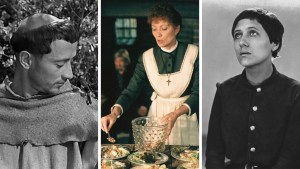Lenten Campaign 2025
This content is free of charge, as are all our articles.
Support us with a donation that is tax-deductible and enable us to continue to reach millions of readers.
Like millions of others, I am a big fan of Stranger Things. I am also aware of all the reasons why Catholics might object to the show, seeing it as gratuitous or utterly secular and, at best, just not edifying.
From another perspective, though, I think Stranger Things can be seen as a particularly exciting, touching, and well-done telling of some of the greatest stories ever told. These are stories about the destructiveness of bad choices, the power of love and community, and the necessity of having a savior who is at home in two worlds.
This really struck me as I recently watched Season 4. Especially in the last few episodes, I couldn’t shake the thought: we keep telling the same stories. I don’t mean this in a negative, there-is-nothing-in-the-theaters-except-reboots kind of way. I mean this in the way that C.S. Lewis meant it when he wrote about the story of Jesus Christ as the “true myth.” I’ll come back to that later, but first, let’s look at what’s been happening in Hawkins and Kamchatka and what these stories have to do with the truths of the Gospel.
[Note: This article contains spoilers.]
Hawkins and Kamchatka
The most striking revelation of Season 4 is the fact that Henry/One/Vecna has been behind the trouble in Hawkins since the beginning. Watching the previous seasons, I got the impression, as I bet many did, that the evil from the Upside Down was its own kind of thing — a standard of horror and science fiction — some kind of alien or demonic intelligence that sought to destroy humanity for its own inscrutable purposes. However, S4 has changed all of that.
As it turns out, the threat is much more understandable to us. The lives and souls of Hawkins and beyond are in danger because of the bad choices of human beings — both Henry Creel and those responsible for his formation, including his parents and doctors, and eventually Martin Brenner. Nature and God gave Henry certain abilities, and he has used those abilities to pursue his own selfish vision.
To me, this makes Stranger Things more relatable than a “battle with the monster from the Great Beyond.” That kind of battle can always be dismissed when we are finished watching: “Well, at least this is just a story and not real.” However, when the true destructive power is the sinful pride that dwells within all of us, the story is a lot harder to forget.
One of the linchpins of the S4 story is the interconnectedness of the evil forces through “the shadow” or “the particles,” which we find out were animated and directed by Henry. This is the whole reason Joyce, Hopper, and Murray put themselves back in danger in the prison; they believe that if they hurt the monsters from the upside-down, even in Kamchatka, it may give El and the kids an advantage in their battle in Hawkins, Indiana.
A connection with the Catholic tradition
This is a concept that connects deeply with Catholic tradition on the nature of good and evil. In a sense, all evil has a single origin, the father of lies (John 8:44), although evil choices are made by humans and angels. St. Augustine described evil not as a substance of its own, but as a privation, as the lack of some good that should rightly exist (Book VII of the Confessions). Every time we choose good and reject evil, we are making the whole of Creation a little bit more what it is intended to be by God. It may not be the case that if I perform a charitable act in Ohio, someone’s life gets noticeably better in the Philippines, but that is close to the reality.
Stranger Things is one more in a long line of stories that show us that the only thing that has the ability to defeat the dark and frightful power of evil is self-giving love. I will focus here on the conflict between El and One in the 4th season. What do we learn about Henry’s early life and his reasons for doing the things that he does?
Well, certainly, better parental and medical guidance could have helped. However, the place where Henry is led by his power and his uniqueness is to delusions of moral superiority over the rest of humanity. He comes to think that he is the privileged arbiter of humanity’s actions and their ultimate fates — really, the same delusion that has animated every modern dictator from Napoleon to Daniel Ortega. This condescending, self-centered vision naturally leads to hatred of others, a hatred that, combined with Henry’s preternatural powers, threatens to destroy humanity.
Contrast that with El’s journey
Much of El’s struggle in S4 is to figure out how best to use her powers and whether she is, to borrow the title of an episode, a monster or a superhero. She has changed, and been changed by, the group of friends and adoptive family who have integrated her over the course of the seasons. She seems to have realized that love is what binds people together and determines the status of their relationships and their interactions. She hasn’t quite grasped this early in the season, when she tries to deal with her loneliness and isolation by lashing out at Angela, first with her dormant psychic powers and subsequently with the most 80s of teenaged weapons – a roller skate.
Later, when she comes to believe that she killed everyone in the Hawkins lab, she sees herself as a monster. However, with the help of her friends and her conscience, she realizes that she must use her abilities for good, to save those she loves and all the others who don’t deserve Henry’s wrath.
El has a foot in two worlds. She is a human, a child, who wants a family and a father, and is conscious of her own flaws. However, she has a kind of “divine” power, given to her for reasons she does not understand.
Did you ever wonder why we keep telling stories about love saving the world? Or why, in those stories, we are usually saved by someone with one foot in our world and one in another?
C.S. Lewis had trouble accepting the claims of the Gospels because they seemed to him like “myth,” and he associated myth with lies. However, he eventually came to see that the myths we tell are better or worse attempts to access the deep truths of the human story, and that the Gospels are the deepest and truest stories there are.
Perhaps we keep telling these stories because we know, intuitively, that the only Person who can save us from our sin and misery is the One who has feet planted in Heaven and on Earth.



